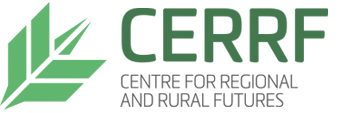The effects of climate change are industry- and region-specific. Our sustainable environment program seeks to inform our knowledge of climate change impacts across regions and industry sectors. This enables the opportunities form a changing climate to be exploited, while remaining informed of climate risks to regional and rural industries and communities.
Project aim
To advance and implement the latest knowledge and science that ensures sustainable regional and rural development.
Project examples
Climate smart agriculture development in the Goulburn Broken region
This project uses a broad range of soil, weather and atmospheric data to model the suitability of agricultural land, now and into the future, under various climate change scenarios.
Listening to the land – looking to the future
This project utilises our spatial planning and climate modelling skills to better understand the impacts of climate change in the Hepburn region in Victoria, Australia.
CeRRF’s Sustainable Regional Development Group
Globalisation, population growth, economic structural adjustments, climate change and extreme weather events are having major impacts on socio-economic and environmental systems around the world. These are major challenges, but through sound analysis and effective planning the changes can be harnessed to create new opportunities for urban, regional and rural communities.
CeRRF’s Sustainable Regional Development group works collaboratively with communities, businesses and governments on problems and opportunities related to climate change, food production, water management, green energy systems, regional development, smart cities and sustainability. The group’s work has had a substantial impact in regional Australia and a number of developing countries (see map).
The Sustainable Regional Development group also has a strong focus on teaching and training. The group developed, and now delivers, the Master of Sustainability – Specialisation in Sustainable Regional Development (and associated Diploma-level and Graduate Certificate-level course). The Master degree (two year full-time or four years part-time) combines coursework with a one-year research project on any aspect of regional development, with additional elective and professional placement options. The course currently has approximately 40 students from more than 15 countries. The group also trains PhD students on a diverse range of real-world problems, often in conjunction with industry partners.
The group’s leaders, A/Prof Robert Faggian and A/Prof Victor Sposito and have also been appointed by Deakin’s Vice-Chancellor as Senior Advisors, Latin America. In this capacity, they assist Deakin’s Global Engagement Division to develop strategic partnerships and projects in Latin America, with a focus on Brazil, Uruguay, Paraguay and Chile.
Selected Projects
- Environmental remediation of crude oil-contaminated soils in Kuwait caused by the First Gulf War
Approximately 115 km2 of the Kuwaiti land were contaminated by crude oil during the First Gulf War. The United Nations has awarded the State of Kuwait a war compensation fund (US$3.6 billion) for the clean-up of the contaminated environment. CeRRF is currently developing cost-effective technologies that can be used for remediating the crude oil-contaminated soils and groundwater with a special reference to the Kuwait oil lake areas. This project has been supported by an industrial grant (AU$900,000) from the Kerrison Asia Pacific Ltd. Additional funding support from the Kuwait Oil Company in the near future is expected. - Greenhouse gas emission and soil carbon dynamics in mangrove wetlands on the South China Coast
This is a collaborative project with the South China Normal University. The project has been funded by the National Natural Science Foundation of China. The project involves monitoring of greenhouse gas (CO2, CH4 and N2O) emission from the contaminated mangrove wetlands in the Pearl River Delta, southern China and evaluating the soil carbon status in the mangrove soils/sediments. Joint supervision of HDR students is part of the collaboration.
Sustainable Regional Development Group Happenings
Robert Faggian presented to the VFF Peninsula branch on April 12 (“The future of green wedge agriculture”). The event sold tickets!
Robert Faggian was invited by the CEO of South Gippsland Shire to present to his Council’s leadership team and to Regional Development Victoria on climate-related economic development opportunities in Gippsland, on March 25th.
Madeleine Johnson represented CeRRF at the Managing Climate Risk in Agriculture 2019 Conference, Warragul in June (20th) with a headline speaking slot, the organisers also sought a very well-received presentation at their 2018 event in Beechworth
Soil Health Group
Inoculants for plant nutrition in the Greater Mekong Region (GMR), ACIAR (Australian Centre for International Agricultural Research)
The project aims to understand the current status of inoculant production, distribution and use in the GMR to confirm or refute anecdotal evidence of a decline in the use, efficacy and production standards of nutrient acquisition enhancing inoculants, particularly, but not limited to rhizobia and micro-rhizosphere inoculants. This project delivers on Deakin and the
faculties strategic intent to engage strongly with Vietnam, through a key Australian funding opportunity in ACIAR.
Capacity Building for Intercropping legumes in Thailand, Vietnam, Myanmar, Cambodia and Laos – Agronomy and soil health, legumes and their rhizobia, delivery of rhizobia and mycorrhiza and quality control.
This program developed capacity to assess the microbial quality of commercial inoculants and to distinguish ineffective products from quality inocula in their national markets. The high costs of nitrogenous fertilizers, phosphate and other agricultural inputs in developing countries is driving the development and use of beneficial microbes to enhance crop production. Microbial products are a relatively cheap alternative to fertilizers, and perform very well in different environments (including different crop and soil types). However, there is little information on the actual content of these products, and quality controls are poor. Agricultural microbial inoculant products are being sold in SE Asian countries which have not been certified to be pure cultures (or to have a controlled level of contaminants), assessed for efficacy, or their potential to be human pathogens.

